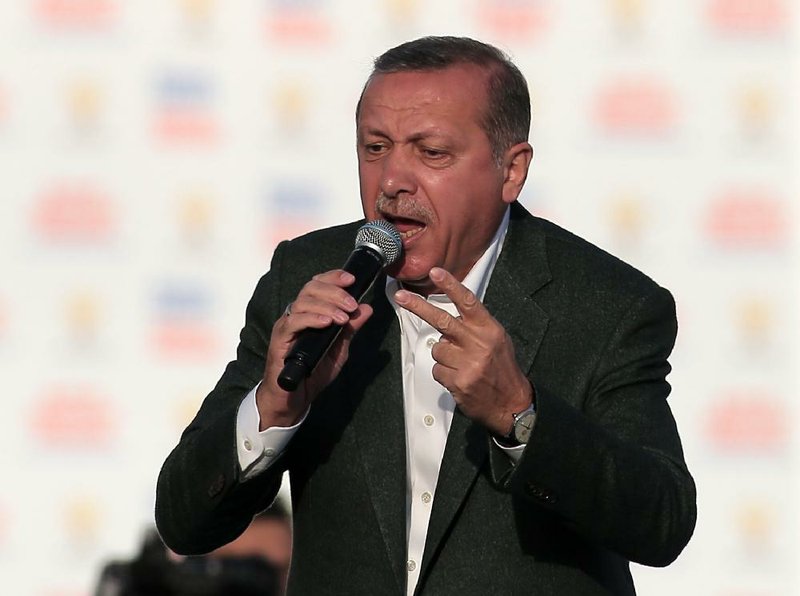ISTANBUL - Turkish fighter jets shot down a Syrian warplane Sunday after it violated the country’s airspace, Turkey’s prime minister said, in a move likely to ramp up tensions between two countries already deeply at odds over Syria’s civil war.
A spokesman for Syria’s military confirmed the incident, denouncing it as a “blatant aggression.” The unnamed spokesman quoted on Syrian state TV said the plane was hit while pursuing gunmen near the border and that the pilot safely ejected from the aircraft.
Syria’s official SANA news agency quoted the pilot as saying that he was shot down 5 miles inside Syrian airspace.
Turkey, a NATO member that once had good ties with Syria, has emerged as one of the strongest critics of Syrian President Bashar Assad and is now one of the main backers of the three-year-long rebellion against him. Hostilities have flared along the border on several occasions, although the exchanges of fire have generally been brief and very limited in scope.
Despite protestations from Syria, there was little indication either side wanted the confrontation to escalate.
Two Syrian warplanes entered the airspace over southern Turkey on Sunday, but one turned back to Syria after the pilots were warned by the Turkish air force, a statement posted on the military’s website said. When the other Syrian plane did not comply, it was shot down by a Turkish F-16 fighter jet, the statement said.
The flights of the two Syrian MiG-23 jets north from Syria were monitored for 80 nautical miles, and the pilots were warned four times before reaching 10 nautical miles of Turkish airspace, the statement said.
One of the planes continued to fly for about a mile into Turkish airspace before “one of our F-16 planes on patrol fired a missile to the Syrian plane in line with the rules of engagement,” the Turkish military said.
Turkish Prime Minister Recep Tayyip Erdogan congratulated the military and said the strike should serve as a warning against further incursions.
“If you violate our border, our slap will be hard,” he said.
The Lebanon-based Al-Mayadeen TV, which has a network of reporters around Syria, reported that the pilot of the downed warplane landed in the village of Bahluliya in Latakia province. It gave no further details.
Syrian rebels launched an offensive in the Kassab area of Latakia near the Turkish border Friday. The rugged hills near the frontier have been engulfed in heavy fighting since then.
On Sunday, activists and state media reported clashes near the town and said both sides were dispatching reinforcements. Syrian officials said the opposition fighters were coming from inside Turkey.
The Britain-based Syrian Observatory for Human Rights reported clashes between troops and rebels led by fighters from the al-Qaida-linked Nusra Front near Kassab and a strategic hill known as “Observatory 45.” It added that some of the shells fired by Syrian troops fell on the Turkish side of the border.
State TV reported late Sunday that the commander of the pro-government National Defense Forces Hilal Assad was killed in the fighting against opposition fighters in Kassab.
The commander was a member of Assad’s family, but the agency did not say if they were close relatives.
Syria’s Foreign Ministry said Sunday that the Turkish government has launched over the past two days an “unprecedented and absolutely unjustified military aggression against the sovereignty of the Syrian territories in the Kassab.”
It said that “this aggression aimed to cover the entry of armed groups into Syria and was part of the aggressive policies of the government of Recep Tayyip Erdogan.”
SANA said in a statement on its Facebook page that Turkey targeted the plane in Syrian airspace while it was pursuing “terrorist gangs,” the Syrian government’s term for the rebels and the jihadists who fight alongside them.
This is not the first time that the Turkish military has downed a Syrian aircraft near the border.
In September, a Turkish fighter jet shot down a Syrian military helicopter after it entered Turkish airspace. The helicopter strayed more than 1 mile into Turkish airspace, but crashed inside Syria after being hit by missiles fired from the jet, Turkish officials said at the time.
Turkey changed its rules of engagement in 2012 after Syria shot down a Turkish military plane, declaring that any Syrian military element approaching the Turkish border would be treated as a legitimate target.
Meanwhile, hours-long clashes overnight in a Beirut neighborhood between supporters and opponents of Assad killed one person, prompting Lebanese troops to deploy in the area Sunday to calm tensions.
The gunmen - from rival Sunni groups - exchanged gunfire and rocket-propelled-grenades for several hours on the edge Beirut’s predominantly Sunni neighborhood of Tariq Jadideh, the worst fighting in the Lebanese capital in nearly two years.
Lebanon’s Internal Security Forces said one person was killed and 15 were wounded in the fighting.
Information for this article was contributed by Albert Aji, Desmond Butler, Suzan Fraser, Bassem Mroue, Ryan Lucas and staff members of The Associated Press, and by Sebnem Arsu of The New York Times.
Front Section, Pages 5 on 03/24/2014


